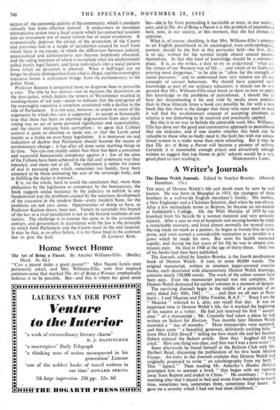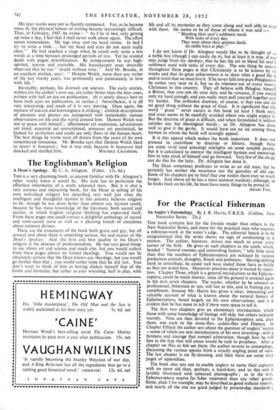A Writer's Journals
The Denton Welch Journals. Edited by Jocelyn Brooke. (Hamish Hamilton. 15s.) TiE story of Denton Welch's life and death must by now be well known. He was born in Shanghai in 1915, the youngest of three brothers in a well-to-do English merchant's family. His mother, a New Englander and a Christian Scientist, died when he was eleven. After a few melancholy terms at Repton, he became an art-student at Goldsmith's College. On the Whit Monday of 1935 he was knocked from his bicycle by a woman motorist and very seriously injured. After a year or two of hospitals and nursing-homes he made a remarkable recovery, and lived almost normally for several years. Having made no mark as a painter, he began at twenty-five to write prose, and soon earned a considerable reputation as a novelist in a genre which he made his own. But soon his health worsened rapidly, and during the last years of his life he was in almost con- tinuous pain. He died in 1948 at the age of thirty-three. Only two of his books had then been published.
The Journals, edited by Jocelyn Brooke, is the fourth posthumous book of Denton Welch. It runs to some 80,000 words. The original manuscript; written in nineteen paper-covered exercise books, each decorated with characteristic Denton Welch drawings, contains nearly 150,000 words. The work of the editor cannot have been easy. Even the manuscript journal was not complete, for Denton Welch destroyed his earliest volumes in a moment of despair.
The surviving Journals begin in the middle of a sentence of an entry dated July 10th, 1942: ".... and then we all met at Pens- hurst ; I and Maurice and Filthy Freddie, R.A.F." Since I am the " Maurice " referred to I, also, can recall that day. It was an important time in Denton Welch's life, for it marked the beginning of his success as a writer. He had just received his first " accept- ance" of a manuscript • Mr. Connolly had taken a piece he had written on Sickert for Horizon. Two months later Denton Welch recorded a " day of miracles." More manuscripts were accepted, and there came " a beautiful, generous, deliriously exciting letter" from Miss Edith Sitwell" telling me how much she and her brother Osbert enjoyed the Sickert article. How they 'laughed till they cried.' How one thing was clear, and that was I was a born writer ! Soon afterwards he found himself at the Reform Club with Mr. Herbert Read, discussing the publication of his first book Maiden Voyage. An entry in the Journals explains that Denton Welch had originally propose4 to write "an autobiography from my birth." This " lapsed." Then reading Mr. Ackerley's Hindoo Holiday prompted him to attempt a book "that began with my running away from Repton and ended in China." He continues : "Every morning after that I stayed in bed and wrote from breakfast to lunch time, sometimes two, sometimes three, sometimes four hours. It gave me a serenity which I had not had since childhood." His later works were not so fluently composed. For, as he became more ill, the physical labour of writing became increasingly difficult. Thus, in February, 1947, he writes : " As I lie in bed, only getting up twice a day, I feel that I shall never walk about again. The effort seems•tremendous. My legs sway and my head swims. In bed I try to write a little ... but my head and eyes do not seem really clear." He had reached a stage when he could only write a few words at a time between prolonged periods of rest. Yet he resisted death with pagan determination. By temperament he was high- spirited, intense and excitable. His housekeeper once shrewdly observed that he was" drunk without wine." And Mr. Brooke, in an excellent preface, says: " Denton Welch, more than-any writer of the last twenty years, was profoundly and passionately in love with life."
Inevitably, perhaps, his Journals are uneven. The early entries, written for the author's own use, are rather better than the later ones, written with half an eye on publication. (It is surely always best to have both eyes on publication, or neither.) Nevertheless, it is all very interesting, and much of it is very moving. Once again, the mixture of naivete and knowingness is striking ; childish descriptions of presents and picnics are juxtaposed with remarkably mature • observations on life and the world around him. Denton Welch was not at peace with himself ; affectionate yet suspicious, adventurous yet timid, eccentric yet conventional, sensuous yet puritanical, he looked for perfection and could see only flaws in the human heart. The best things he wrote were all drawn from the years of his own remembered innocence. Mr. Brooke says that Denton Welch liked to epater le bourgeois ; but it was only because le bourgeois had



































 Previous page
Previous page